Paralympian ignored teacher to chase cycling dream
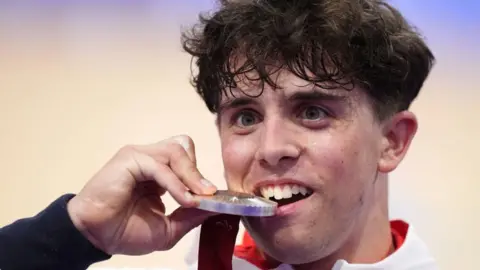 PA Media
PA MediaAs a teenager, Archie Atkinson could not believe it when one of his teachers told him to quit cycling because it would apparently never amount to anything.
But with the backing of his parents, the 16-year-old instead decided to leave college and pursue his dreams in the sport he loved.
The now 20-year-old Paralympian, from Heaton Moor in Stockport, Greater Manchester, said to hear that as a 16-year-old was "pretty hard".
"To be told your dreams mean nothing, and what you wanted since you were a little kid was worthless... so I left college the next day," Atkinson said.
That single-minded determination, not to mention a desire to prove a point, has certainly paid off.
"Less than a year later I won my first world championships," said Atkinson.
"So I sent her a nice email... but I'm sill waiting on a response."
Atkinson has shared his story as part of BBC North West Tonight's six-part series about living with invisible disabilities and conditions.
The 20-year-old, who has cerebral palsy, attention deficit hyperactivity disorder (ADHD) and autism, grew up around cycling and enjoyed many family bike rides as a child.
His first experience of riding on a track came when he was 10 years old, under the tutelage of Olympic champion Sir Chris Hoy.
But it was not until a chance encounter with double Paralympic gold medallist Ben Watson while on a ride with his father in 2021 that he truly decided to pursue his cycling dreams.
Atkinson discovered he was eligible for para-cycling and was accepted on to the British Cycling Foundation Pathway.
Within a year, he was promoted to its world-class performance programme.
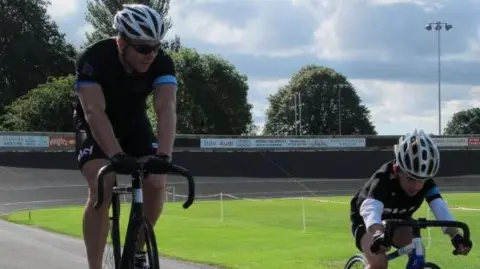 Archie Atkinson
Archie Atkinson"The Paralympics is a whole manner of disabilities," said Atkinson. "It's pretty cool."
He thinks there is considerable ignorance though.
"I was recently at an event in America and you tell them 'I'm a Paralympian' and the first thing they do is look you up and down and try to find your disability.
"I can understand it. I don't look disabled from the outside, but it's quite hurtful because you're questioning 'is that person disabled'?"
Atkinson said he really struggled at school and was "bullied pretty much for four years during high school".
He said: "I used to do para football for quite a while and they found out where I trained.
"They would film it, post it on social media, use sort of disabled slurs under some stuff."
Atkinson said those tough experiences had made him the person he is today.
"It's built a character that helps in elite sport, as I'm a bit more tough."
He said his conditions "don't change who I am. It's a written thing on a piece of paper from a doctor but to have it – I'm proud of it.
"I wouldn't be me without it so there's no reason to hide it."
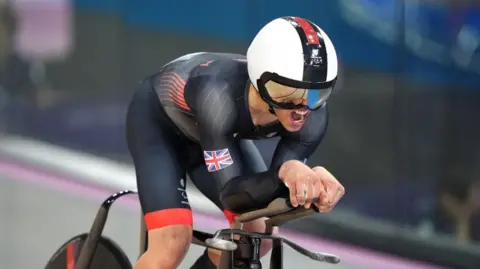 PA Media
PA MediaAtkinson's experiences are echoed by fellow cyclist Kiera Byland.
The 27-year-old, from Bolton, said she only felt safe from the bullies at school when she was hiding in a toilet cubicle.
A decade on, she has five world championships to her name.
"Sport has been a lifeline that has helped me to be able to accept who I am and make me happy of who I am," said Byland.
She said cycling had also helped her to connect with people.
"I have grown as a person, picking up lifelong skills," she said.
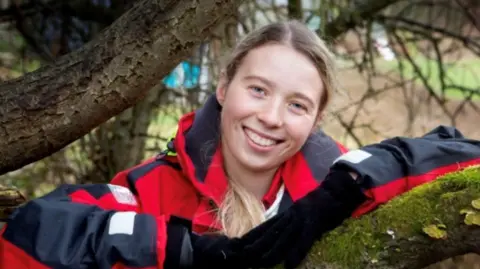 Kiera Byland
Kiera BylandSport has opened so many doors for Byland.
After winning six Special Olympics gold medals, she serves on both the competition's International and Great Britain Board of Directors.
The Special Olympics, in which people with intellectual disabilities from around the world compete, were founded in 1968.
Byland has autism, a learning disability and Rubinstein Taybi Syndrome - a condition which affects people in different ways and to varying degrees, according to the RTS Support Group.
"Just having a diagnosis and labels sometimes is difficult because people only see the labels on the paper, they don't see you as a person," she said.
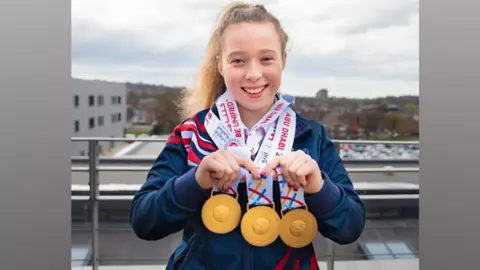 Kiera Byland
Kiera BylandByland is determined to help others who are also living with disabilities and conditions which are not immediately obvious.
"I always say, I like to be the person that I wish I had when I was younger.
"If you're in a dark place right now, in school, and you're struggling with academics, there is a different way.
"Life doesn't have to be in one direction.
"You can make your own path and thrive and survive in many ways."
Archie Atkinson and Kiera Byland feature in a special six-part BBC North West Tonight series about invisible disabilities and conditions. You can watch it on BBC One in the Northwest of England and the Isle of Man from 18:30 BST on Monday 7 July. It will also be available on the BBC iPlayer.
Listen to the best of BBC Radio Manchester on Sounds and follow BBC Manchester on Facebook, X, and Instagram. You can also send story ideas via Whatsapp to 0808 100 2230.
